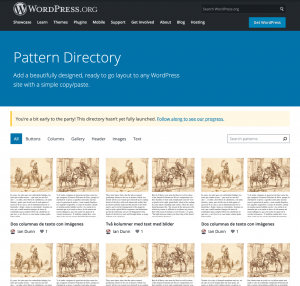One reason Polyglots celebrate Translation Day is to raise awareness around translating WordPress. Even though translate.wordpress.org currently supports more than 200 locales Locale = language version, often a combination of a language code and a region code, for instance es_MX denotes Spanish as it’s used in Mexico. A list of all locales supported by WordPress in https://make.wordpress.org/polyglots/teams/ into which WordPress can be translated, people still regularly submit requests on the Make/Polyglots blog for additional language versions!
According to Ethnologue, there are about 7,000 languages spoken in the world!
Of course we’re interested in adding these new languages to our platform. However, before a language can be added, quite a few checks need to be done to make sure that everything is right, such as information about the language, what script it uses, how plural forms are handled, and so on. At in-person contributor days, Polyglots contributors often helped to review these new requests, checking for all the necessary information and helping to move them to the next steps.
However, the last two years have had almost no such in-person contribution days, and this task has in reality been paused, for too long! Now that we’re celebrating WordPress Translation Day 2021 virtually, it is a great time to come together (virtually) and move this task forward.
Who can help
Experienced Polyglots contributors! New Polyglots are welcome to help as well, but it’s helpful to have some previous Polyglots experience and/or experience with contributing to your own locale Locale = language version, often a combination of a language code and a region code, for instance es_MX denotes Spanish as it’s used in Mexico. A list of all locales supported by WordPress in https://make.wordpress.org/polyglots/teams/.
If you’re new to Polyglots and looking for a way to get involved, you can find some helpful ideas in the Participate in your own time section.
How to help
The last few open requests are visible in the sidebar A sidebar in WordPress is referred to a widget-ready area used by WordPress themes to display information that is not a part of the main content. It is not always a vertical column on the side. It can be a horizontal rectangle below or above the content area, footer, header, or any where in the theme. on our Make/Polyglots blog, along with this link that brings you the full list.
Polyglots Global Mentors and contributors typically review each new locale request to check for a few things:
- The locale doesn’t already exist and is, in fact, needed
- The information related to the language is complete and accurate
- There are enough people interested in helping to translate WordPress into that language
- Encoding the system parameters needed to define the new locale in WordPress’ system
You can see examples from completed locale requests, which are a useful way to learn how others have approached requests in the past.
When you’re ready to help review a locale request, make sure you’re familiar with and follow the steps in:
The goal is to make sure the information provided is accurate and complete, and that the person making the request has the interest and support to move forward with translating WordPress into this language. In other words, the goal isn’t to block Block is the abstract term used to describe units of markup that, composed together, form the content or layout of a webpage using the WordPress editor. The idea combines concepts of what in the past may have achieved with shortcodes, custom HTML, and embed discovery into a single consistent API and user experience. anyone but to ask questions, be curious, and help guide contributors to the best solution.
Once a locale request has been fully reviewed and approved, it needs to be added to GlotPress. You can do this by opening an issue with the relevant information, following this format. Please open only one issue or pull request per locale, and be sure to track any information in the related spreadsheet.
When to help
This will be an asynchronous sprint taking place from September 17 to 30, 2021, during the WordPress Translation Day global events. That means you can help whenever you have time! Just follow the instructions above, and be sure to log what you’re working on in this spreadsheet. We’ll be using this spreadsheet to track our progress over the course of these two weeks and to help keep track of which requests are being worked on.
If you have any questions or need help along the way, please leave a comment on this post or ask in the #polyglots channel on the Making WordPress Slack. This way, we can share all the information in one place, and your questions will help others contributing, too!
Thanks to @tobifjellner for helping to write this post.
#wptranslationday



You must be logged in to post a comment.